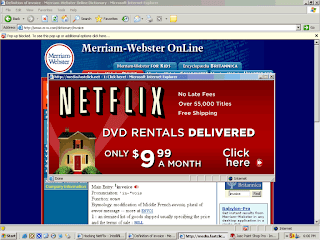One characteristic of news is that it needs to be constantly updated. There are many news organizations trying to vie for the news story before others get to it. This competition is good for the viewers, because they always receive updates at a quick pace. If a news organization were too slow, they would not receive as many viewers because news gets old quickly. One example of news people need immediately at times is the weather and the effects of it. The flooding around this area is something residents need to hear about as soon as possible. People need to know what to expect when conditions are bad. The faster residents can see the news the faster they can react. This is why speed is important to news crews.
When news organizations compete against others, they need to get the facts quickly before giving them out to the public. Major news stations need to be accurate in their findings because they are held accountable for the content they publish. Journalists have a difficult job because their job is to be fast and accurate, unlike blogs which are not required to be either. There are professional bloggers though, who work from a distance, yet still deliver their news. They can be found on most news sites .
News has to be fast to keep up with the times, and accurate to build people's trust in them so they return for more news. The news keeps flooding in, but there is always more to find. It's amazing journalists don't burn out.
Friday, March 27, 2009
Saturday, March 14, 2009
blogs vs. other news
Blogs have not been around very long. The first blogs began appearing in 1997, but didn't become widely used by the general public until 2000. Blogging has changed the way many view news. Anyone can create their own blogs and share whatever information they see fit to share. This had a direct effect on other internet news. There are some big differences in the accuracy of what is written.
While blogs share the news based on the people's opinion, other news organizations share information that is researched. Blogs contain information, but they also include a lot of opinions and the blogger's own views on the subject. Bloggers also can write whatever comes to their mind. The information they post could be completely wrong. They don't have to run their ideas past an editor or have someone decide what is important to write. The information posted is exactly what the writer wants to say. Others may criticize what they write, but that does not force them to change.
A news organizations, on the other hand, must research the news topic widely and pass the story through many editors before it makes it onto the website. Organizations are held more accountable for what they write because many people trust their sites. If too many mistakes are made, then their business suffers. Employees for a news site are paid for the work they do, so if they don't do well, they can be fired. A blogger writes for their own reasons. They aren't paid, and if the information they post is inaccurate, they might receive negative comments. No one can fire them because the blogs are written on the blogger's own time.
Blogs have been seen as a source of information, but they cannot be trusted for accurate information. News emlpoyees write for a living, posting information they know is true, and can be trusted over bloggers.
While blogs share the news based on the people's opinion, other news organizations share information that is researched. Blogs contain information, but they also include a lot of opinions and the blogger's own views on the subject. Bloggers also can write whatever comes to their mind. The information they post could be completely wrong. They don't have to run their ideas past an editor or have someone decide what is important to write. The information posted is exactly what the writer wants to say. Others may criticize what they write, but that does not force them to change.
A news organizations, on the other hand, must research the news topic widely and pass the story through many editors before it makes it onto the website. Organizations are held more accountable for what they write because many people trust their sites. If too many mistakes are made, then their business suffers. Employees for a news site are paid for the work they do, so if they don't do well, they can be fired. A blogger writes for their own reasons. They aren't paid, and if the information they post is inaccurate, they might receive negative comments. No one can fire them because the blogs are written on the blogger's own time.
Blogs have been seen as a source of information, but they cannot be trusted for accurate information. News emlpoyees write for a living, posting information they know is true, and can be trusted over bloggers.
Sunday, March 8, 2009
Foreign News
Foreign news was not always available to people. Before Morse code was sent in 1844, messages had to be carried by hand. During the period of Colonial America, for example, messages from America to England took weeks or even a month to deliver depending on the weather. Messengers would have to wait for a ship to carry them across the ocean to deliver whatever news they had. Even with the telegraph system, the signals could only travel a certain distance. It wasn't until radio that the general public could hear about news that happened from other countries. The Pearl Harbor attacks in 1941 were able to be heard a few days after the event. Later TV allowed people to view the news in addition to radio announcements. All of these inventions were not able to give news right away.
The invention of the World Wide Web gave access to news anywhere on the planet that had connection to the internet. News that was documented on the other side of the world could be viewed minutes later. News about foreign affairs can be read at any time and people can be allerted to any dangers that may be threatening. We can also find joys from internet news too. The Summer Olympics could entertain many watchers on the internet. Events happening throughout the day could be seen if they were missed earlier. The internet has allowed anyone with connection to see what is going on in the world. Secrecy is becomming hard to find. The world became a bit smaller due to the impact of internet.
The invention of the World Wide Web gave access to news anywhere on the planet that had connection to the internet. News that was documented on the other side of the world could be viewed minutes later. News about foreign affairs can be read at any time and people can be allerted to any dangers that may be threatening. We can also find joys from internet news too. The Summer Olympics could entertain many watchers on the internet. Events happening throughout the day could be seen if they were missed earlier. The internet has allowed anyone with connection to see what is going on in the world. Secrecy is becomming hard to find. The world became a bit smaller due to the impact of internet.
Sunday, March 1, 2009
Ads on internet

Do you ever get annoyed by pop-up ads and other advertisements on the internet? Why are there more ads on some sites than others? On certain sites, more ads are displayed because they receive more traffic. On CNN's website, the right side of the screen has a few ads, but on Facebook, the almost the whole right side is all ads. It seems like these ads only bug people instead of help to sell something. Well, these ads do more than just fill space on the screen, they are the majority of the income for the site.
Advertising is a large part of a website, TV program, radio broadcast or nearly any other form of media. Companies spend millions of dollars so that people will see their company name and product. The majority of spending is on TV ads. Five times more money is spent on TV ads than internet ads. Why? TV ads are much bigger and noticeable. A TV ad takes up the full screen, not just a part of it. TV ads are also unavoidable unless you turn the TV off every time an ad comes on. An internet ad can be ignored because it is only a small part of the webpage. Internet ads also need to be clicked on for more information. The viewer controls what ads they view. This is why more money is spent on TV ads. TV ads are costly, but the price per viewer is low. Internet ads are relatively inexpensive ("$0.60 pay-per-click or $1,200 - $1,800 a month for aggressive campaigns (does not include search engine optimization) or $200 to $1,200 per year per banner ad on websites" (www.iesmallbusiness.com/resources/Major_Media_Types.doc). Advertising is essential for a website or other programs to function, whether we like to see them or not. Without ads, we would not get to enjoy some of the media we use.
Subscribe to:
Posts (Atom)
